By Robert St. Martin

Los Angeles, CA (The Hollywood Times) 7/20/23 – Coming up at Outfest on Saturday is The Mattachine Family, a narrative film that marks Andy Vallentine’s feature-length directorial debut in a story about a contemporary middle-aged gay couples’ crisis regarding parenting. Written by Andy Vallentine’s partner Danny Vallentine, The Mattachine Family by its very name evokes a sense of queer history, with a reference to the pioneering gay rights organization in Los Angeles started by Henry Hay in the 1950s. If anything, the historical name link gives us a sense of how the issues of gay rights has progressed in the past 60 years. I asked the writer Danny about the inspiration for the film and he told me that he and Andy were considering adopting a child at the time he was writing it. And to borrow a line from the film spoken by its protagonist Thomas: “I could be gay, be married, and be a father.”
Click below to see our live interview:
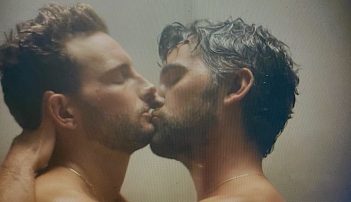
The film is presented in vignette-style segments with intervening by the character of Thomas (played by Nico Tortorella), who is a photographer with a passion for his work. In a short, highly concentrated introduction piece that begins the film, we learn that Thomas as a boy was also interested in photography and eventually did fashion photography as well as shooting fancy weddings. It is at one such wedding at the beach that Thomas stumbles upon a former child sitcom star Oscar (played by Juan Pablo Di Pace). From the introductory narrative, we get a sense of both characters. Oscar is down on his luck as an actor without any real work but the attraction between the two men is spontaneous and they head into bed easily and onto marriage and what seems to be an idyllic, loving relationship. The chemistry between the two actors playing Thomas and Oscar is charming and the love feels palatable.
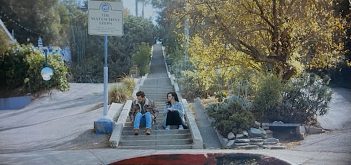
Because Oscar doesn’t have a lot of calls for his acting skills, he puts his energy into the life he has with Thomas, who is the main breadwinner and has a very nice home in Los Angeles – probably the Silverlake District. What happened to Oscar’s previous acting career? His acting career was derailed when he was outed by one of the tabloids. Thomas has a circle of supportive friends, a typical “chosen family” that includes Lea (Emily Hampshire), who he has known since they were freshmen at the university, and Lea’s spouse Sonia (Cloie Wyatt Taylor), who is a fine cook and busy planning to open some kind of foodie place. This is Thomas’ “chosen family” –topped off by Thomas” first neighbor in Los Angeles and Platonic queer friend, the ever-amiable Jamie (Jake Choi).

At the beginning of the film, Thomas and Oscar and quite happy together. While in bed together, Thomas suggests that they should have a child in their lives and even willing to consider having a foster child placed with them. Suddenly, Arthur, an adorable, innocent child whose family lost everything in a fire, gets placed with them through Child Protective Services. Arthur’s mother is a single parent and, due to some minor criminal activity, is in prison. Oscar is alright with the idea of having a foster child because he was a product of the foster care system. Oscar lost his father at an early age. Unlike their lesbian friends, they do not consider surrogacy which is the route chosen by some of their queer friends. Thomas’s best friend Lea (Emily Hampshire) and her wife Sonia (Close Wyatt Taylor) are trying to conceive through IVF and lesbian Annie (Heather Matarazzo) lives with her gay friend Ted (Carl Clemons-Hopkins) and co-parent their child together, whilst having separate sex lives.
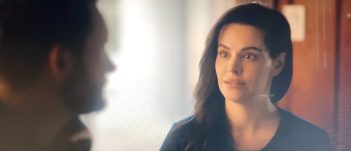
Neither Thomas or Oscar anticipated the difficulties of having a young boy in their lives, but they quickly become so attached to Arthur that they are ill-prepared for the news a year later from Child Protective Services that Arthur’s biological mother is out of prison and wants her boy back. The impact is devastating for both Thomas and Oscar but in very different ways. Oscar no longer wants to play father with a foster child and gets a lucrative casting offer for a television series – to be shot in Michigan. Thomas prefers to mope around over the loss of Arthur and bury himself in his photography work.
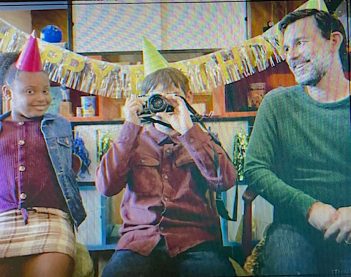
Once Oscar thrusts himself into his work in the hopes of a career rejuvenation, he is gone much of the time, although he still loves Thomas. On the other hand, Thomas is a bit of a mess, seeing in some of his circle, how surrogacy might be possibility – although the cost of at least $150,000 is rather daunting and the challenges real. There is not much subtlety about how the camera lets Thomas see recollected images of a happy young boy named Arthur. With Oscar busy with filming in Michigan, Thomas dwells on his loneliness and eventually comes to some realization about how much being a father – even so briefly with Arthur – means to him.
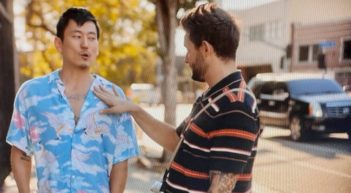
Andy and Danny Vallentine’s film is about personal growth. But that growth is only recently possible in the United States, with changes in the laws that have made surrogacy and adoption actual options for LGBTQ persons to have children. The Mattachine Family reflects on the dilemma of becoming a queer parent in a comparatively more tolerant world. This is a very sincere film, despite its feel-good ending. Perhaps that ending is an optimistic projection of the hope of the two married filmmakers who conceived this project before having a child of their own, which now is the case. The film devotes ample time to the struggles of Lea with trying to get pregnant and bear a child, as well as Thomas’s Asian friend, Jamie (Jake Choi), with his very over-the-top gay stereotypical behavior.
The performances by this cast of actors are fairly strong in expressing their shared camaraderie as “queer” best friends, but the character of Thomas (as portrayed by Nico Tortorella) is self-centered, controlling, and extremely needy – hardly father material. The last 30 minutes seem to have more in common with gay romcoms and I think the third act could have been stronger if left ambiguous.
Danny Vallentine is known for his work on Sabotage (2014) and Train Wreck (2015). Andrew Vallentine draws his creative inspiration from his experience of being a dyslexic gay kid in small town Michigan. What was once his shame he now considers his greatest strengths. Andrew has developed content with Amy Baer at Gidden Media, Tyra Banks with Bankable, and most recently has been hard at work developing a WWII series based on the newly discovered hundreds of love letters sent between two gay British soldiers in the 1940s – the short film version of which, The Letter Men (2021), is based on the real love letters written by Gilbert Bradley to his sweetheart, Gordon Bosher during World War II.
The Mattachine Family screens at Outfest in the Director Guild of America, Theater 1, on Saturday, July 22, at 1:30 PM. It can also be viewed online through Outfest Streaming, beginning July 24 through July 30. For tickets, go to: www.outfest.org




